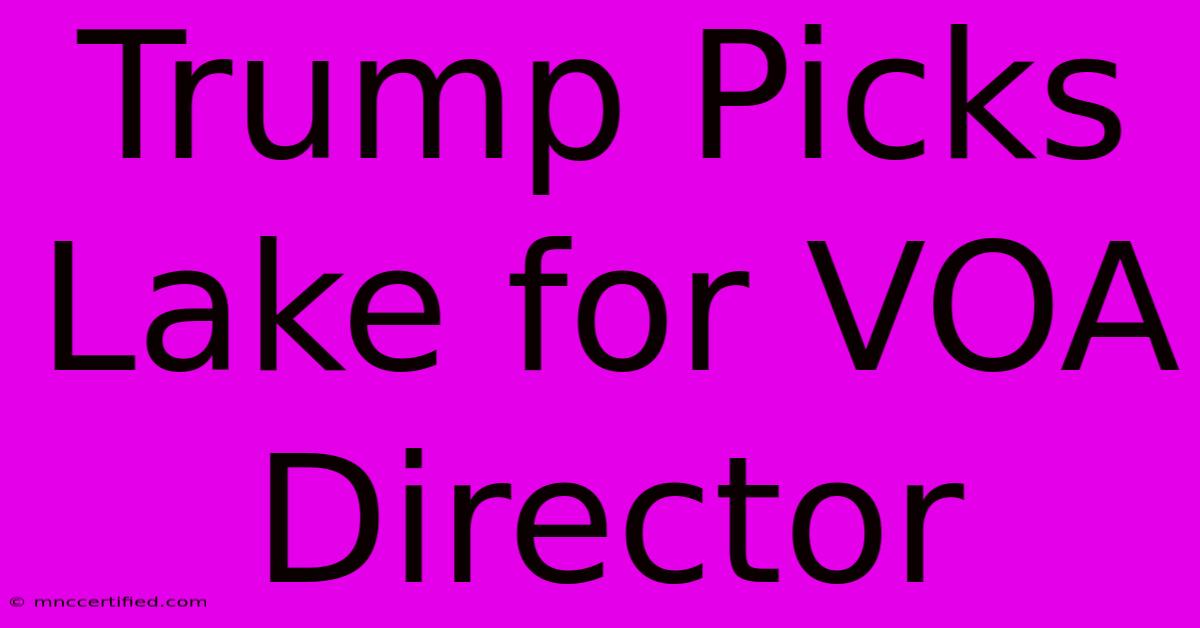Trump Picks Lake For VOA Director

Table of Contents
Trump Picks Lake for VOA Director: A Deep Dive into the Nomination and its Implications
The nomination of Michael Pack, a conservative filmmaker, as the director of the Voice of America (VOA) during the Trump administration sparked significant controversy. This article delves into the details of this appointment, examining its context, the ensuing backlash, and its lasting implications on the agency's journalistic integrity and independence.
Understanding the Voice of America (VOA)
Before analyzing the nomination itself, it's crucial to understand the role of the VOA. The Voice of America is a multimedia international broadcasting service funded by the U.S. government. Its mission is to provide accurate, objective news and information to audiences around the world, particularly in countries with restricted media environments. Maintaining journalistic independence is paramount to its credibility and effectiveness. Any perceived bias or political influence undermines this crucial mission.
The Nomination of Michael Pack: A Controversial Choice
President Trump's selection of Michael Pack was met with immediate and widespread criticism. Pack's background as a conservative filmmaker, coupled with his past statements expressing skepticism about the media's objectivity, raised serious concerns about his commitment to the VOA's core principles. Critics argued that his appointment represented a direct attempt to politicize the agency and potentially suppress dissenting voices.
Concerns Regarding Pack's Appointment:
- Lack of journalistic experience: Many questioned Pack's qualifications to lead a major international news organization, given his background primarily in filmmaking rather than journalism.
- Allegations of political bias: Pack's past statements and affiliations fueled concerns that he would prioritize a conservative agenda over journalistic integrity, potentially compromising the VOA's objectivity.
- Potential for censorship: Critics worried that under Pack's leadership, the VOA would become a mouthpiece for the administration, suppressing critical reporting and favoring narratives aligned with the Trump administration's policies.
The Backlash and its Consequences
The nomination triggered a significant backlash from journalists, media organizations, and free speech advocates. Many expressed alarm at the potential consequences for the VOA's credibility and its ability to serve as a reliable source of information for global audiences. The controversy led to numerous articles, editorials, and public statements condemning the appointment. Several prominent journalists resigned from the VOA in protest, further highlighting the gravity of the situation. These resignations underscored concerns about the agency's future under Pack's leadership and the potential for a decline in the quality and independence of its reporting.
Long-Term Implications: Damage to VOA's Reputation and Trust
The Trump administration's appointment of Michael Pack to lead the VOA had long-lasting repercussions. The controversy surrounding the nomination significantly damaged the agency's reputation for impartiality and objectivity. This damage extends beyond the immediate political fallout, potentially impacting the VOA's ability to build and maintain trust with its international audiences. The perception of political interference can undermine the agency's credibility, hindering its effectiveness in providing reliable news and information. The long-term effects on the VOA's global reach and influence remain to be seen.
Conclusion: The Fight for Journalistic Integrity
The nomination of Michael Pack to head the Voice of America stands as a stark reminder of the ongoing struggle to safeguard the integrity of journalism and the importance of protecting independent news organizations from political influence. The controversy highlights the critical role of a free and independent press in a democratic society and the potential dangers of political interference in media outlets. The debate surrounding this appointment continues to be relevant, underscoring the ongoing need for vigilance in protecting the independence of journalistic institutions. The event served as a cautionary tale emphasizing the importance of appointing leaders who prioritize journalistic integrity and the unbiased dissemination of information above political agendas.

Thank you for visiting our website wich cover about Trump Picks Lake For VOA Director. We hope the information provided has been useful to you. Feel free to contact us if you have any questions or need further assistance. See you next time and dont miss to bookmark.
Featured Posts
-
Broadcom Q4 2024 Earnings Call At 5 Pm Et
Dec 13, 2024
-
Dre Greenlaws Status Questionable
Dec 13, 2024
-
Rams Vs 49ers Tnf Fantasy Breakdown
Dec 13, 2024
-
Uniteds Decline Hojlunds Bright Spot For Amorim
Dec 13, 2024
-
Our Ladys Shrine Cold Cant Stop Faith
Dec 13, 2024